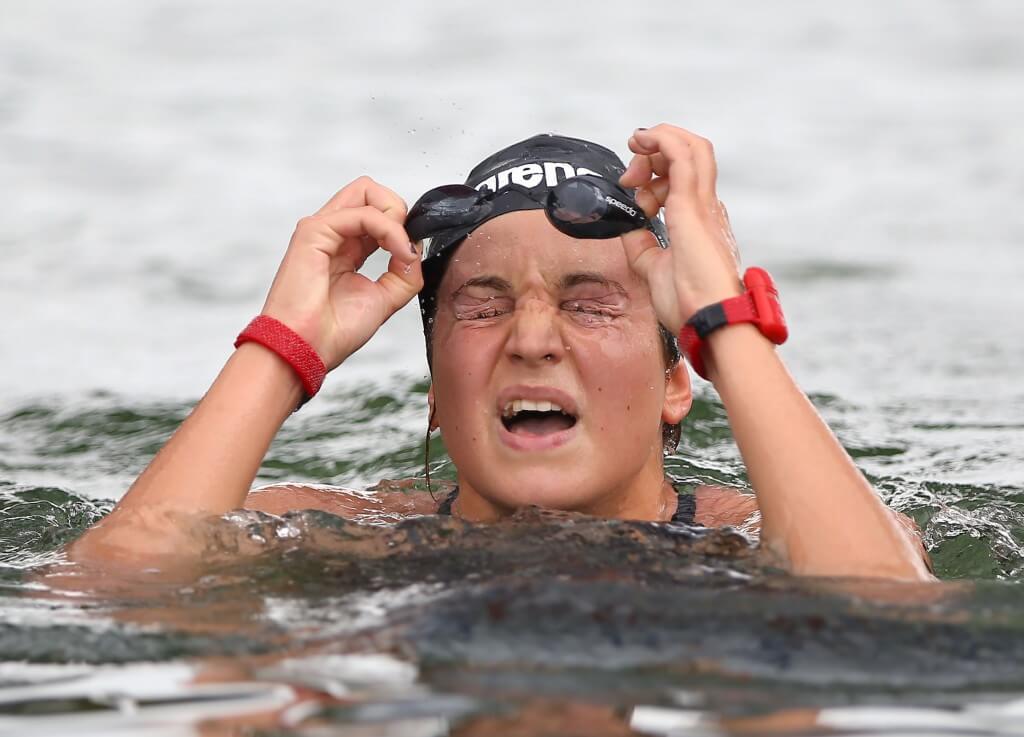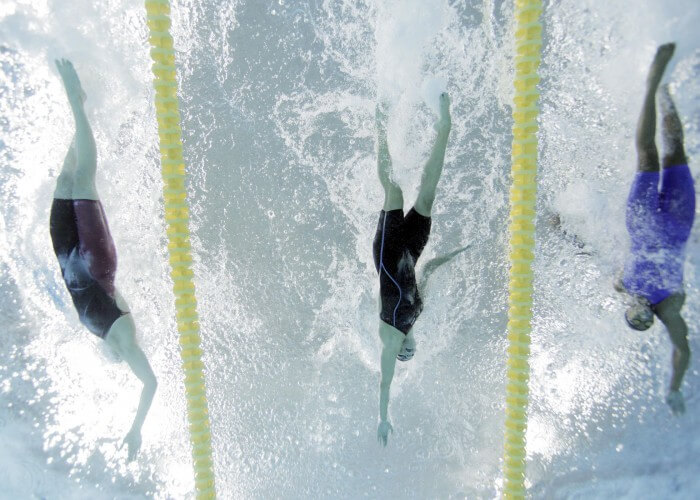10 Swimming Coaching Approaches That Don’t Make Sense

10 Swimming Coaching Approaches That Don’t Make Sense
Originally posted August 12, 2015
Like all sports and all industries, swimming has its fair share of myths, routines, habits, practices and rituals which everyone does…but that doesn’t necessarily make them right.
Swimming coaching can be a game of “follow-the-leader” with new coaches copying the systems and coaching practices of senior coaches without question.
Yet, as it is in all walks of life, being the best means challenging “what is” and being creative and courageous enough to be the first to do “what can be”.
Think about it for a moment.
If you were completely new to swimming, if you’d never been a swimmer, if you’d never seen a swimming race on TV or live at a meet and somebody asked you to sit down while they explained the sport to you – maybe showed you a few videos of Olympic swimmers in action etc, what would you see?
- Short, sprint based competition events;
- Athletes who are explosive and powerful – particularly when they leave the blocks and when they push-off from the walls in turns;
- Athletes who seem to move easily and effortlessly at high speeds through water – something human beings weren’t designed to do well.
Now put all that together….as a “newbie” to the sport:
Swimming is about speed and power and the execution of great skills and excellence in technique in competition conditions.
So armed with that fresh, new look at swimming, what are the 10 Swimming Coaching Approaches That Don’t Make Sense?
1. Start at 5 am or earlier. This has never made sense. The human body needs sleep. Asking children to get out of bed at 4 am and then push them up and down a pool for two hours before the sun comes up isn’t sensible and it’s not necessary. It’s time to re-think the two-hour slogs we call training – the two hour morning and night sessions of mindless lap after lap after lap and look for new and better ways of coaching swimmers.
2. Swim with poor technique. Swimming is a technique driven sport. Moving fast through water demands that movements are technically effective and highly efficient. There’s no point swimming even one lap with poor technique, substandard skills, ineffective streamlining and poor quality turns. Do it right – consistently.
3. Swim long repeats and long sets in training. As most swimming competition events are over in less than 2 minutes, why do we persist with training sets like 40 x 100, 10 x 300, 15 x 200, 2000 for time etc.
In the “old-days” coaches believed that this type of training made you tougher – physically and mentally. Forget being tougher! When you can consistently swim at maximum speed with great technique and outstanding skills under pressure and fatigue conditions in competition, you’re tough! And you don’t learn these skills by swimming 70 miles a week at slow speeds with poor technique.
4. Warm up. Think about it for a moment. When is the last time you – or a swimmer you know – pulled a hamstring or a pec or another muscle when swimming?
It might happen…but it’s very very unlikely. Most swimming injuries are caused by swimming with poor technique or from overuse – i.e. doing too much swimming – too hard – too often – and not from an acute incident or accident.
So why waste 10-25% of workout time warming up? Get in the pool, start swimming and you’ll warm up soon enough.
(Obviously swimmers with existing injuries should take time to prepare for training in accordance with the recommendations of their doctor or physical therapist).
5. Kill speed. Speed is everything. Why do coaches spend months and months doing countless laps of threshold training and hard endurance work then hope that the swimmer’s speed will return during taper? It is all about speed. Why do we spend so much time killing speed when it is the single most important reason we train in the first place?
6. Stretch when cold. We know that muscles stretch better when they are warm. Why are we stuck in this pre-training stretching mindset?
Why not allow swimmers to swim 300, 400, 500 and then – when they are warm – get them out to stretch, do roller work, complete a brief yoga stretching routine etc?
Why not spend three minutes between sets to stretch or use some acupressure and trigger-point “release” techniques to release muscle tension in key muscle groups?
The aim of stretching is to help swimmers get into technically correct positions without stress, effort or strain. So why try to force cold muscles into technically correct positions before they are capable of doing so?
7. Only go fast in the competitive season of the year? And again – speed is everything.
The concept of periodisation does not mean “only” do endurance work pre-season or “only” do speed work during the racing season.
It means balance the skills, attributes and qualities (physical, mental, technical and tactical) required to swim fast over the duration of the swimmer’s program to ensure they achieve their optimal performance level in targeted competitions.
Speed is so special – so precious – that it needs to be enhanced, nurtured and developed all year round…as does endurance….as does flexibility…as does power…as does strength. Periodisation is about emphasis – not exclusion.
8. Only race when you’re at your best. Racing is not always about winning.
It’s about learning. It’s about assessing how training is going and about getting feedback from performance under race conditions so you can change and improve the training program.
Race often – develop a wide range of racing skills and learn the strategies to meet every competitive situation you face and then – when you need to win – when it really matters – you can and you will.
9. Overly rely on equipment. Swim equipment is fun to use. It makes training interesting. It offers additional variety in training sets and practices.
But until they start offering Olympic Gold medals and NCAA titles for kickboard races and paddle events, minimise their use and have a very clear, very specific reason for using them.
You don’t have to do “pull” in all workouts. You don’t need to wear paddles at every training session. Use equipment when it can make a significant improvement to technique, skills and other essential swimming capacities.
10. Leave mental training until the final weeks before the competition. Everything you do in the water is enhanced by the application of a mental skill.
Drills work and skills development benefit from focus and concentration skills.
Relaxation and breathing control is essential in speed and endurance development training.
Visualization is a wonderful skill to master and use before practicing starts.
Far too many coaches and swimmers hear the word “psychology” and assume it’s either about mental illness or something you only practice the day before the meet – usually during some form of “motivation” talk.
Everything you do in the pool – from learn to swim level onwards – everything you do in the pool – has a mental aspect and benefits from the effective connection between the mind and the body.
Swimming Coaching Practices: Dare to be Different – Look at things from a different angle.
The Internet means anyone, can get information about anything, anytime, anywhere and usually for free.
Increasingly, swimming coaching practices and techniques are being challenged, scrutinized and debated as more and more people access the latest ideas, information and innovations from other sports, other industries, scientific research and other sources.
Now, more than ever, successful swimming coaching is about daring to be different, striving for excellence through creative innovation and about being the first to lead the introduction of new ideas and new directions.
Sometimes we’re so busy doing what we do that we don’t have time to think about what we’re actually doing.
Take time to reflect on your training habits and coaching practices, your routines and your rituals and find ways of helping swimmers to get faster….faster.






“1. Start at 5 am or earlier. This has never made sense. ” So when your pool time is extremely limited, you’re saying don’t ask the kids to adapt to the schedule…simply don’t swim?
Peter Leib exactly! They don’t swim at 5am for giggles and grins, they do it because they can get the lane space
It also teaches discipline and time management.
Matthew John #1….. ??
My kids favorite practices are the mornings. Perfect way to get up for the school day.
Also, sweet underhanded USRPT push. Long repeats are useless? Only if you can’t convince your kids it’s worth it.
I don’t this guy and don’t want to judge him but he can’t really believe this shit.
This is a limited essay riddled with incorrect innuendos, and even outright inaccuracies. There are many methodologies, and many reasons to adhere to certain training regimens, and many paths to the top of the mountain. Hate to see a lot of good technical knowledge trashed in one article, belying years of success…
Hockey has practice late into the night, midnight, and beyond
Please list the “old boys coaches” you refer to, by name. I want to know whom not to mimic. Now that would be helpful. Knowing the actual names you are thinking of when you write such guidance that paints a wide brush over a profession that clearly continues to evolve with new world records, and new records and top ten lists at every stage of development. The fact that there is a following of an author that paints such a cloud over a beautiful sunny landscape might make one wonder what is missing in the authors experience. Maybe real world coaching experience? If we blindly followed this advice for a generation one may predict that such an author would begin to write and criticize about “why aren’t we breaking records any longer?” In my humble opinion the coaching world has plenty of checks and balances on it as when a team slows down either the coach adapts or the team replaces the coach.
My comments are strictly based on training methods and results addressed in the article. This article does not approach safesport and neither did I. Not a fair jab. I, personally have a mission to see SafeSport violators prosecuted, legally, period. That is a different article, not addressed in this one, and brining it as a response was uncalled for.
I think it was fair: you made a broad assertion in a very heavily critical comment and talked of this one article as casting a shadow over a sunny landscape … on the horizon and spectrum of coaching, we all know that clouds come with the territory on many levels, including mental health, sex abuse, shouting, screaming, undermining, telling women they’re ‘too fat’, using numbers instead of names to call out certain individuals and much else down the years. I simply pointed out an extreme that tells us why its best never to make generalisations of that kind – they don’t work. As said, it’s perfectly reasonable for you to criticise an article like this – the 5am mention, for example, skirts the reality of many swim programs down the years – but I think it helpful to be specific in your criticism … I don’t see this article as casting a shadow over a whole profession, it points out some valid criticisms of its own, as you do of it.
With regards to an aerobic sport and how the human body makes adaptations, the author needs to do more research. Also, I don’t think the coach WANTS to give kids 5a workouts. Right now, in order to get all of our kids in 2-3 times per week, someone has to go at 6a. This is true for many teams who have limited pool access. Coaches want and need their sleep as much as the kids. And lastly, I know many coaches who have to allow kids to swim with poor technique. We are dealing with motor learning (yes learning) in a fluid environment. A team will lose kids who do not improve if they solely focus on good technique and not fast training. Also, some kids just won’t change their technique and then there are a number of other kids who can’t because their genes gave them inflexibility. How many times a coach reminds kids to streamline boggles my mind.
I am not a huge fan of this article.
Many of the points in this article do make sense if you look at the literature and talk to top coaches. This is written with the tone of one of those parents who thinks they know more than the coach and is always interfering.
And sometimes you just take the pool times that you can get. There’s a lesson there too
Was the author ever a swimmer?
Seriously no warm up!
Is that where you stopped reading? Because a few points later they basically say warm up for a bit and then stretch. Ridiculous.
Warm up also helps you get yourself in the right frame of mind for the session.
Horrible article…. Read Ernie Maglischo’s newest book on physiology so you understand the need for long repeats. And all the great teams I know of do doubles!
Also, punishing swimmers for not making the pace time with more long hard swims. “You didn’t make that pace time? 200 fly!” How does that help a swimmer make the pace time?
I swim at 5 due to work schedule but when I was a kid we swam at 5 as we also had an evening-late afternoon practice.
I agree with most of this article. Except the one about warm up. Warm up is NOT just done because of fear that you might get injured (although that is a reason) but primarily to prepare you body for the ‘work’ to come this also includes warming up the heart and aclimatising to the water conditions.
The point about not stretching when you are cold is valid but contradicts the non warm up advice.
The lack of sleep is my only complaint. Get home from evening practice at 10:30pm then be at 5:00am practice the next day when it’s a 40 min drive. So up at 4:00AM? Then full day of school? Had to say no. Doubles like that in summer when napping can happen, but otherwise the lack of sleep is unhealthy.
I likes this. Thanks.
Looks to be a bad article.
Don’t let the warum off.
And if the pool could accept training from 9 to 11 and school to, it would be awesome.
Event coaches would like to sleep more ?
Charmaine Olivier Prinsloo, Mandi Swanepoel
The ole straw man “Don’t swim long and slow.” No one does that. The best male and female swimmers, Phelps and Ledecky, came from big volume programs. Even the best sprinter in the world, Dressel, goes big. Threshold and Aerobic AND speed needed if you want to be the best
Tommy Aitken
Chloe Osborn
Kerri Addison
Wow. There is so much here. I am just trying to break into coaching after a loooongggg break from competitive swimming. I came from a high volume training time (the 80’s) and I am trying to catch up with the times. So confusing, but I am digging in!